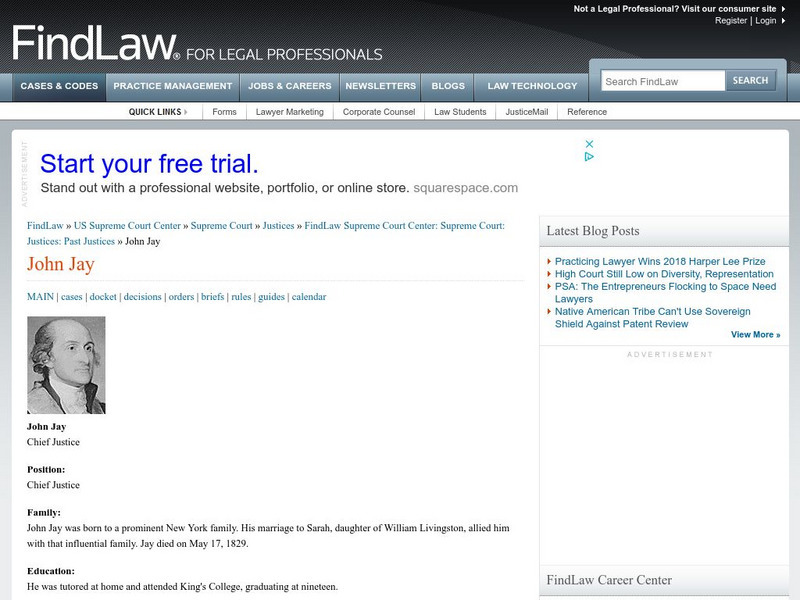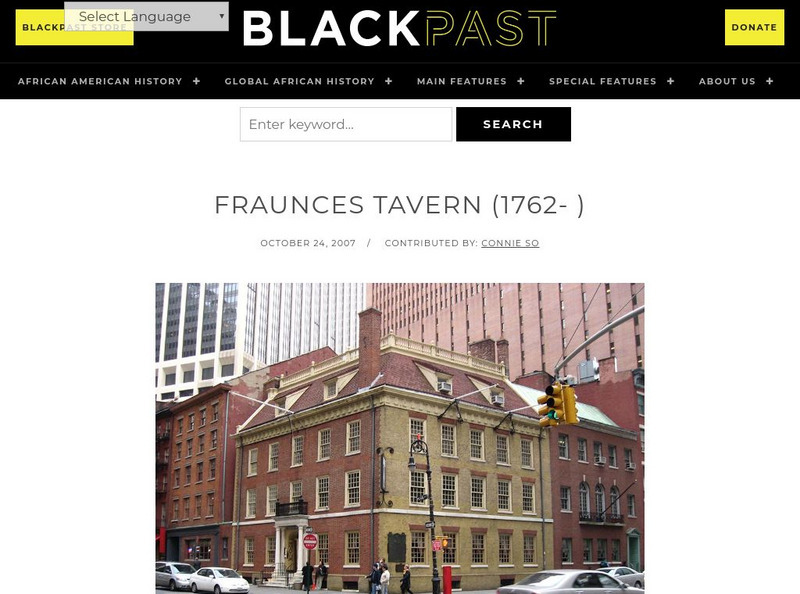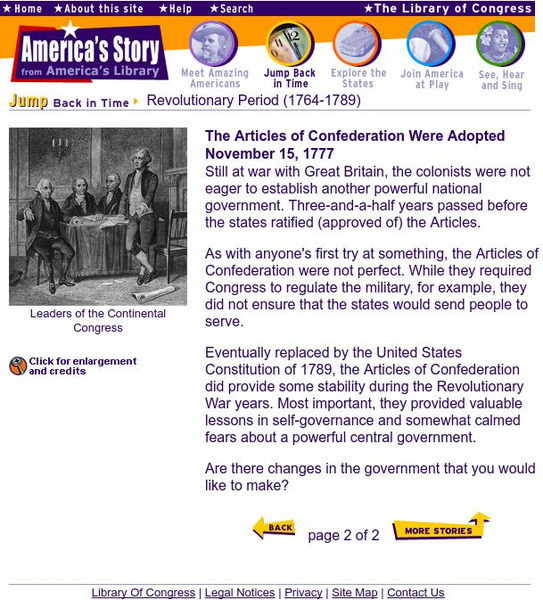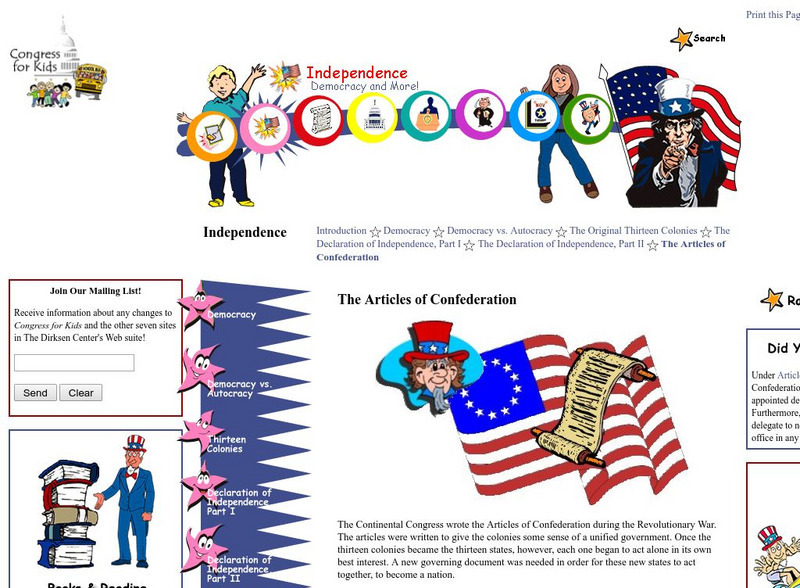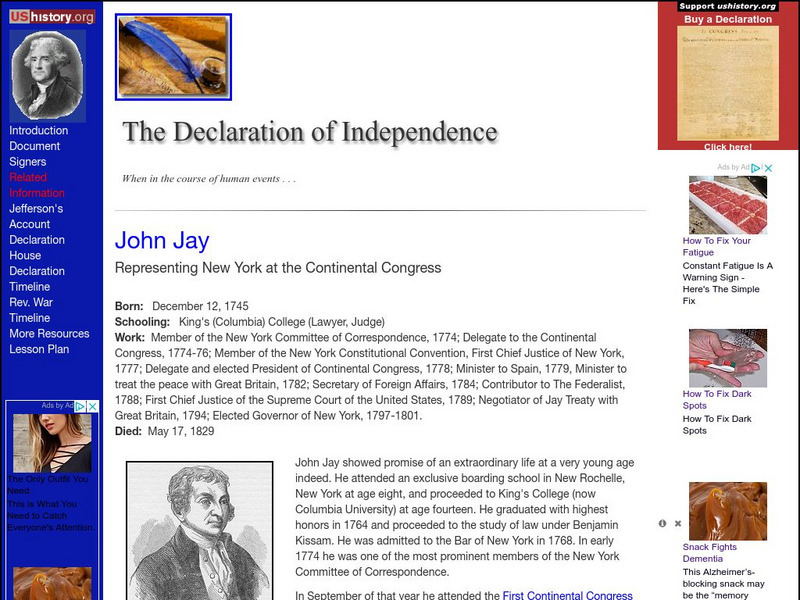Bill of Rights Institute
Bill of Rights Institute: Charles Carroll
Charles Carroll is primarily remembered today for his political leadership in Maryland during the Revolutionary era. A wealthy planter, Carroll became a major figure in the patriot movement in 1773 when he penned the First Citizen...
Varsity Tutors
Varsity Tutors: Archiving Early America: Rise and Fall of Newburgh Conspiracy
This is a discussion of the economic reasons for the 1783 Newburgh Conspiracy, a plot by some of the officers in the Continental Army. The site summarizes the events of the conspiracy.
US Department of State
Office of the Historian: Continental Congress
The roots of our government began with the Continental Congress. Examine the roles this Congress played in the relationship between the colonies and Great Britain.
Library of Congress
Loc: The Treaty of Paris Is Ratified
The Continental Congress gathered to end the Revolutionary War, and solidify their independence from England with the Treaty of Paris. Briefly overviews the events, and presents a photo of the Maryland State Capital, where the delegates...
Library of Congress
Loc: Washington's Letter to Continental Congress
George Washington's letters to the Continental Congress give us a glimpse into his thoughts and ideas during the American Revolution. Features a sample of one of these correspondences, along with a portrait of Washington, and a historic...
Thomson Reuters
Find Law: Supreme Court Justices: John Jay
A biography of the first Chief Justice of the U.S. Supreme Court and author of some of the Federalist Papers.
Black Past
Black Past: Fraunces Tavern
An encyclopedia article about the role of the Fraunces Tavern, owned by the black merchant, Samuel Fraunces, before, during, and after the Revolutionary War.
Library of Congress
Loc: The New Nation, 1783 1815
The links in the New Nation, which is provided for by the Library of Congress, will lead you to sets of selected primary sources on a variety of topics,such as the Constitution, governmental policy on Native Americans, and problems and...
Library of Congress
Loc: America's Story: Articles of Confederation Adopted Nov. 15, 1777
This informative and easy-to-read site contains information about how the United States formed its first government under the Articles of Confederation. From the Library of Congress
Library of Congress
Loc: American Memory: Journals of the Continental Congress
From the Journals of the Continental Congress, dated July 4, 1776 in which students can read the exact words which were read to the delegates at the Continental Congress, listing the grievances against the King of England.
The Dirksen Congressional Center
Congress for Kids: The Articles of Confederation
At this site read a short synopsis of the Articles of Confederation, and then complete a short quiz by clicking on the "show what you know" link at the bottom.
PBS
Citizen Ben: Founding Father
As part of a larger site about the extraordinary Benjamin Franklin, this section focuses on his being one of founding fathers of the new United States of America. Read about the three major documents he signed as a delegate and diplomat.
Digital History
Digital History: Articles of Confederation
A good look at the government under the Articles of Confederation. See what powers the central government had, the powers of the state governments, and discover the problems that ensued.
Independence Hall Association
U.s. History: John Jay
A brief biography of John Jay's life and political career. Discusses his role in the First Continental Congress and authoring of three articles that are now collectively known as "The Federalist."
Other
Potus: James Monroe
Comprehensive facts about James Monroe and his presidency. Includes biography, election results, cabinet members, odd facts, and notable events.
A&E Television
History.com: Continental Congress
From 1774 to 1789, the Continental Congress served as the government of the 13 American colonies and later the United States. The First Continental Congress, which was comprised of delegates from the colonies, met in 1774 in reaction to...
Library of Congress
Loc: Biographical Directory of the u.s. Congress: Alexander Mc Dougall
This site from the U.S. Congress provides a short biography of Alexander McDougall, a member of the Continental Congress who fought in the Revolutionary War.
Library of Congress
Loc: Biographical Directory of the u.s. Congress: Oliver Ellsworth
A brief biography of Oliver Ellsworth, the delegate from Connecticut to the Constitutional Convention. He also served as a senator and as a Chief Justice of the Supreme Court.
Soft Schools
Soft Schools: Declaration of Independence Quiz
This easy-to-understand multiple-choice quiz takes you through events before, during, and after the signing of the Declaration of Independence. Review your score and any missed questions at the end.
Ducksters
Ducksters: Quiz: The Continental Congress for Kids
History Questions: The Continental Congress Quiz, Test, and WebQuest
Independence Hall Association
U.s. History: Middle Colonies: The Ideas of Benjamin Franklin
A brief biography of Benjamin Franklin covering his career as a printer, philanthropist, inventor, and public servant.
Siteseen
Siteseen: Government and Constitution: Declaration of Independence
The Declaration of Independence, made by the second American Continental Congress and adopted July 4, 1776, announced the separation of the original thirteen North American British colonies from Great Britain making them into the United...
Siteseen
Siteseen: Land of the Brave: John Hancock
Overview and biographical facts on the life of John Hancock, patriot and leader of the Sons of Liberty. The signature of John Hancock was the first to be added to the Declaration of Independence.
Siteseen
Siteseen: Land of the Brave: Thomas Jefferson
Overview and biographical facts on the life of Thomas Jefferson, a Founding Father of the United States who drafted the Declaration of Independence and later became the third US President.





